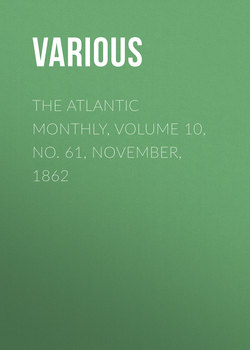Читать книгу The Atlantic Monthly, Volume 10, No. 61, November, 1862 - Various - Страница 8
WILD APPLES
THE LAST GLEANING
ОглавлениеBy the middle of November the wild apples have lost some of their brilliancy, and have chiefly fallen. A great part are decayed on the ground, and the sound ones are more palatable than before. The note of the chickadee sounds now more distinct, as you wander amid the old trees, and the autumnal dandelion is half-closed and tearful. But still, if you are a skilful gleaner, you may get many a pocket-full even of grafted fruit, long after apples are supposed to be gone out-of-doors. I know a Blue-Pearmain tree, growing within the edge of a swamp, almost as good as wild. You would not suppose that there was any fruit left there, on the first survey, but you must look according to system. Those which lie exposed are quite brown and rotten now, or perchance a few still show one blooming cheek here and there amid the wet leaves. Nevertheless, with experienced eyes, I explore amid the bare alders and the huckleberry-bushes and the withered sedge, and in the crevices of the rocks, which are full of leaves, and pry under the fallen and decaying ferns, which, with apple and alder leaves, thickly strew the ground. For I know that they lie concealed, fallen into hollows long since and covered up by the leaves of the tree itself,—a proper kind of packing. From these lurking-places, anywhere within the circumference of the tree, I draw forth the fruit, all wet and glossy, maybe nibbled by rabbits and hollowed out by crickets and perhaps with a leaf or two cemented to it, (as Curzon an old manuscript from a monastery's mouldy cellar,) but still with a rich bloom on it, and at least as ripe and well kept, if not better than those in barrels, more crisp and lively than they. If these resources fail to yield anything, I have learned to look between the bases of the suckers which spring thickly from some horizontal limb, for now and then one lodges there, or in the very midst of an alder-clump, where they are covered by leaves, safe from cows which may have smelled them out. If I am sharp-set, for I do not refuse the Blue-Pearmain, I fill my pockets on each side; and as I retrace my steps in the frosty eve, being perhaps four or five miles from home, I eat one first from this side, and then from that, to keep my balance.
I learn from Topsell's Gesner, whose authority appears to be Albertus, that the following is the way in which the hedgehog collects and carries home his apples. He says,—"His meat is apples, worms, or grapes: when he findeth apples or grapes on the earth, he rolleth himself upon them, until he have filled all his prickles, and then carrieth them home to his den, never bearing above one in his mouth; and if it fortune that one of them fall off by the way, he likewise shaketh off all the residue, and walloweth upon them afresh, until they be all settled upon his back again. So, forth he goeth, making a noise like a cart-wheel; and if he have any young ones in his nest, they pull off his load wherewithal he is loaded, eating thereof what they please, and laying up the residue for the time to come."
